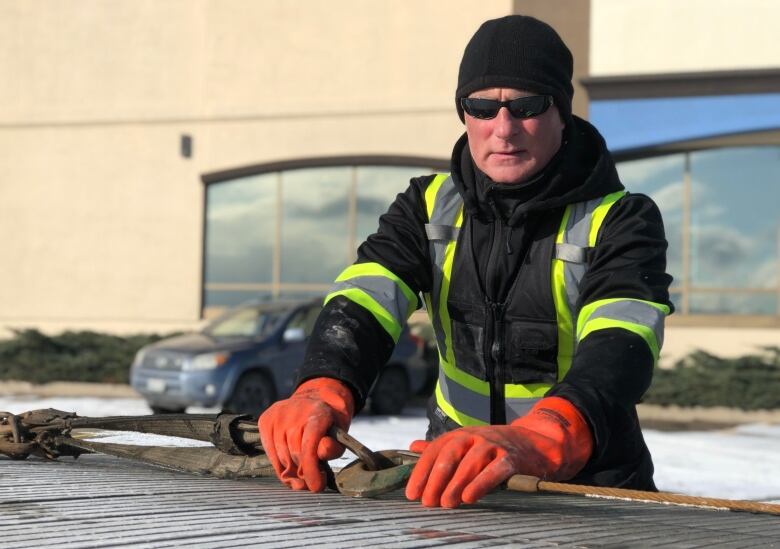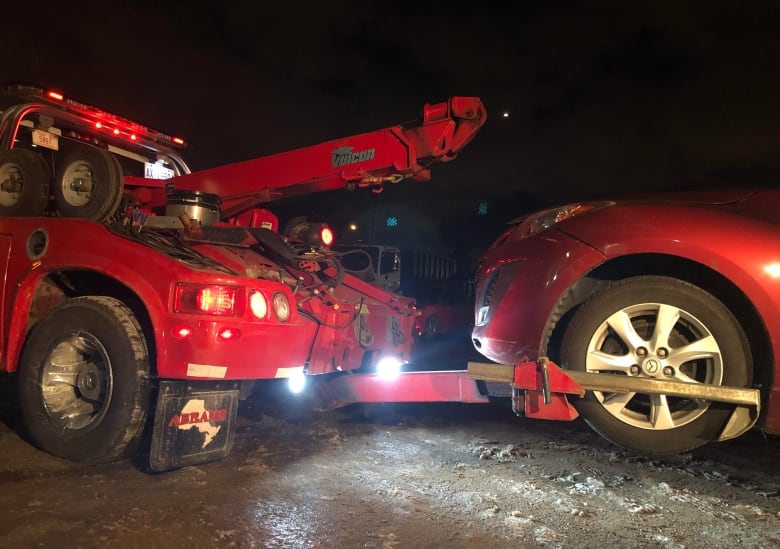Shootings, arson, threats: Ontario tow truck association wants stricter rules to combat chaos
Lack of regulations allowing 'bad apples' to work within industry, PTAO president says

Ontario's tow truck association is calling on the government to implement provincial licences and a set of standards amid violence and chaos in the industry.
President of the Provincial Towing Association of Ontario (PTAO) Mark Graves said "bad apples" are taking advantage of the industry because of a lack of regulations that allow nearly anyone to operate a tow truck.
"We've had murders, vehicles burned," he said. "It hasn't escalated outside the industry. But we really want to try to get a handle on this before it does."
The association represents around 150 towing companies in the province, but Graves said there's no concrete way of knowing how many there actually are in Ontario.
He said the market is becoming saturated, which is causing some drivers to fight for business and creating turf wars in the industry.
'The problems are increasing'
CBC Toronto spoke with a long-time tow truck driver who said he's been assaulted and threatened both on and off the job. CBC has agreed not to use Gord's last name or the name of his company over concerns for his safety.
"I'm scared," he said. "Over the years it's getting a lot worse.The problems are increasing."

Gord's company instructs drivers not to go to crash scenes on provincial highways because he said it's become a "free-for-all" since rules changed allowing the first truck on the scene of an accident to get the business.
Other drivers — known as accident chasers — listen to radios and watch social media and traffic apps, and then rush to be first on the scene.
"You'll have five, six trucks show up and then some of these guys will get into arguments over who's getting it," Gord said. "You'll get drivers fighting and arguing and punching each other and stuff."
Turf wars and organized crime
Three tow trucks were lit on fire early Tuesday morning in Hamilton and the owner of one told CBC News he believes he was targeted over an ongoing territory battle.
"Tow truck competition is pretty fierce out here," Zachary Bobola said.

The first truck he bought to run his towing company is now beyond repair and he's afraid the rest of his fleet may also get torched.
"You eliminate one truck off the road, that's one less truck that's going to take money off the road," he said.
Last week, a tow truck driver was shot at in a GO commuter parking lot near Richmond Hill. Police say it was a targeted attack and are still looking for a suspect after at least three shots were fired. The driver wasn't hit.
In June, Toronto police announced the arrest of 73 people, including tow truck drivers, in connection with an organized crime investigation. Deputy Chief James Reymer said some tow trucks smashed through the front of a jeweller store and guns were fired. He said officers seized guns from tow truck operators who were prepared to shoot other drivers over territory.
Gord said the recent violence has forced some to leave the industry.
"They said it's not worth it. They have families, young children."
A push for more red tape
In an attempt to push the provincial government to create a set of industry standards for tow truck operators, Graves created a presentation called "Gangs, Guns and Tow Trucks."

"There's no work rules or regulations to go to an accident scene and tow a vehicle away," he said. "There's lots of vehicles that are ill-equipped for doing the job that are servicing people on the roads."
Graves wants to see provincial licensing, equipment and training standards and possibly criminal background checks.
"The industry is screaming for it," he said of tougher rules.
"How often does an industry look for red tape and government intervention? The majority of the people want to play by the rules, but there really are no rules."
Of the 444 municipalities in Ontario just 17 have tow truck bylaws and regulations, according to the Canadian Automobile Association (CAA).
CAA said it's working with groups including PTAO and the Insurance Bureau of Canada to lobby the government.
"There are presently no towing laws that exist at the provincial level. Towing rates and standards are generally not regulated in Ontario, and where there is regulation, it's usually in larger urban centres," Ray Chan, Manager Government Relations at CAA South Central Ontario said in a statement, adding those rules aren't always followed.
Province not considering licensing for operators
In a statement the Ministry of Government and Consumer Services said it's not considering provincial licensing for tow truck operators, but said it will be reviewing the consumer protection act next year — the first comprehensive review in nearly 15 years.
"As part of this review, the ministry will be consulting with the public, businesses and other stakeholders and may consider potential changes to the towing and storage services requirements; however, the licensing of businesses or individuals is not within scope of the act," the statement read.
The president of Abrams Towing in Toronto said rather than provincial licensing, he'd like to see all parties involved create an accident plan that's enforced by police.
"[So] we know who's going to do the job, we know what the price is going to be and nobody's subject to the whims of some person that comes out and is potentially going to take advantage of them," Joey Gagne said.
One way that happens is tow trucks bringing damaged vehicles to body shops they're in cahoots with, according to Gagne.
"There's some bad apples that do that and then there's some guys that are just trying to get work in their shop," he said. "So the bad apples are the ones that give everybody a bad name."
Gord wants consumers to know they don't have to use the first tow truck that appears after a crash.
"If you can get your car off to the shoulder that would be the best thing to do, and call your insurance company and let them recommend a towing company for you and a place to go," he said.

